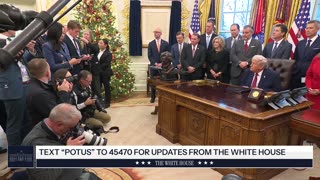Premium Only Content

Earth's Moon - The Secrets hidden from all
Special access program
Special access programs (SAPs) in the U.S. Federal Government are security protocols that provide highly classified information with safeguards and access restrictions that exceed those for regular (collateral) classified information. SAPs can range from black projects to routine but especially-sensitive operations, such as COMSEC maintenance or presidential transportation support. In addition to collateral controls, an SAP may impose more stringent investigative or adjudicative requirements, specialized nondisclosure agreements, special terminology or markings, exclusion from standard contract investigations (carve-outs), and centralized billet systems.[1] Within the Department of Defense, SAP is better known as "SAR" by the mandatory Special Access Required (SAR) markings.
Types and categories.
Two types of SAP exist – acknowledged and unacknowledged. The existence of an acknowledged SAP may be publicly disclosed, but the details of the program remain classified. An unacknowledged SAP (or USAP) is made known only to authorized persons, including members of the appropriate committees of the United States Congress. Waived SAPs are a subset of unacknowledged SAPs in the Department of Defense. These SAPs are exempt by statutory authority of the Secretary of Defense from most reporting requirements and, within the legislative branch, the only persons who are required to be informed of said SAPs are the chairpersons and ranking committee members of the Senate Appropriations Committee, Senate Armed Services Committee, House Appropriations Committee, and the House Armed Services Committee. Oftentimes, this notification is only oral.
Involved individuals.
SAP access ergo policy on classified security categories de facto is understood informally as described as those who need to know have access, access is "on a need to know basis". A SAP can only be initiated, modified, and terminated within their department or agency; the Secretary of State, Secretary of Defense, Secretary of Energy, Secretary of Homeland Security, the Attorney General, the Director of National Intelligence; their principal deputies (e.g. the Deputy Secretary of State in DoS and the Deputy Secretary of Defense in DoD); or others designated in writing by the President. These offices are better known as 'classification authorities.' They retain the right to declassify or revise classification levels.
-
 1:11:25
1:11:25
vivafrei
3 hours agoKash Patel's Jacket-Gate! Pfizer Whistleblower Qui Tam on Appeal! Meanwhile in Canada! AND MORE!
42.7K24 -
 16:30
16:30
Clintonjaws
7 hours ago $2.30 earnedEntire Room Speechless as Pete Hegseth Snaps Destroying All Media To Their Face
12.9K7 -
 22:12
22:12
Dad Saves America
3 hours agoHow Greek Philosophers Created Western Civilization: The Death of Debate - Pt 2
3.28K -
 LIVE
LIVE
LFA TV
19 hours agoLIVE & BREAKING NEWS! | WEDNESDAY 12/03/25
1,320 watching -
 1:05:46
1:05:46
The Quartering
4 hours agoNew Epstein Video Drops! The US Economy Has SCARY Numbers Released & More
116K26 -
 1:07:11
1:07:11
The White House
6 hours agoPresident Trump Makes an Announcement, Dec. 3, 2025
32K15 -
 1:26:28
1:26:28
Film Threat
22 hours agoINSIDE THE DECLINE OF DISNEY! A WARNING FROM THE PAST | Hollywood on the Rocks
14.9K1 -
 1:15:43
1:15:43
DeVory Darkins
5 hours agoDISTURBING: Gavin Newsom makes FATAL MISTAKE after Criminal Illegal Alien kills 11 year old boy
128K80 -
 2:53:35
2:53:35
MattMorseTV
4 hours ago $15.76 earned🔴Trump's HUGE ANNOUNCEMENT.🔴
49.6K43 -
 1:18:21
1:18:21
Sean Unpaved
5 hours agoArch Manning & Texas ELIMINATED From College Football Playoff Contention | UNPAVED
46.6K3